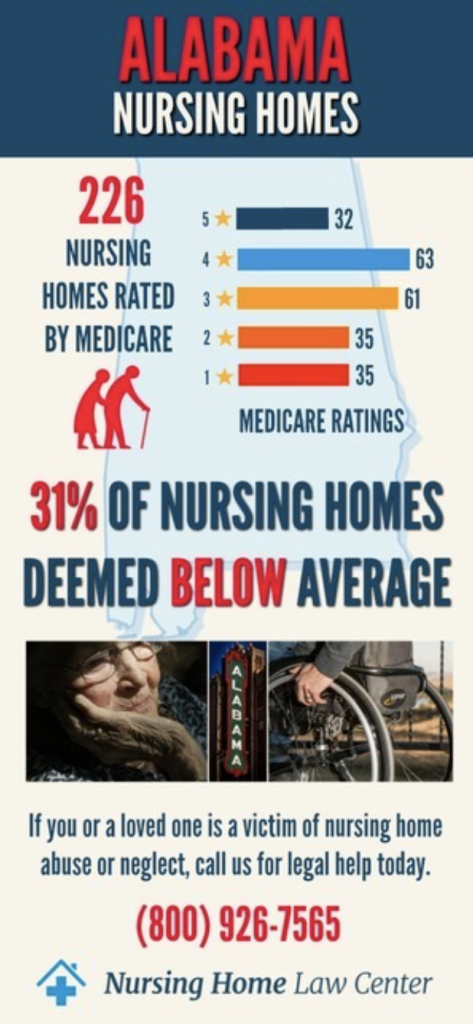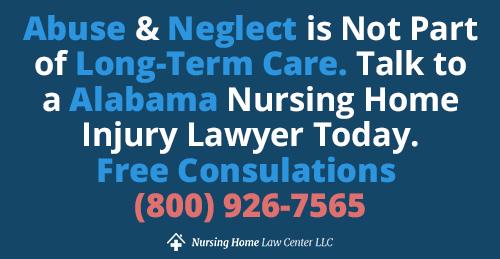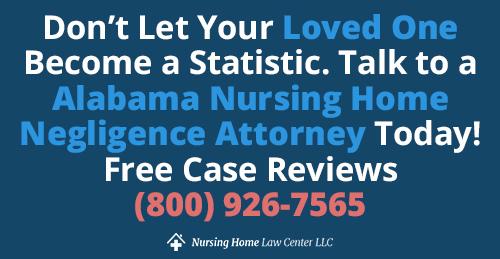The Nursing Home Law Center is committed to providing the legal resources necessary to hold negligent facilities accountable.
Alabama Nursing Home Abuse Lawyer

Licensed in Alabama
Nursing home abuse is a devastating issue affecting vulnerable residents in nursing facilities across Alabama. Many elderly individuals rely on nursing homes for the care they need to live with dignity. Still, far too often, this trust is broken through neglect, abuse, or exploitation.
Families need to take immediate legal action if they suspect nursing home abuse. Seeking help from an experienced Alabama nursing home abuse lawyer ensures victims receive justice and financial compensation for their suffering.
Why Hire Nursing Home Law Center
At Nursing Home Law Center, we are dedicated to obtaining justice and compensation for victims of nursing home abuse. Our law firm team has a strong history of managing nursing home abuse cases with care, consistently securing substantial settlements and verdicts on behalf of our clients.
Our skilled nursing home negligence attorneys carry out detailed investigations to ensure every aspect of the abuse is thoroughly addressed, from medical bills to emotional distress and other related damages. With our extensive knowledge in handling nursing home abuse claims, we work diligently to protect your rights and ensure the responsible parties are held accountable.
We provide compassionate guidance and clear communication throughout the legal process, ensuring you and your family are supported, protected, and well-informed.
Types of Cases Handled by Our Alabama Nursing Home Abuse Lawyers
Nursing home abuse occurs when elderly residents in nursing or assisted living facilities experience harm through neglect, mistreatment, or intentional abuse by caregivers or staff. This abuse can take many forms, each with severe physical, emotional, and financial consequences for victims and their families.
Our lawyers handle a variety of nursing home negligence cases, including the following:
Physical Abuse
Physical abuse involves the use of force that results in injury or pain to a nursing home resident. This assault can include hitting, slapping, or pushing, as well as improper use of physical or chemical restraints, which can lead to serious injuries like broken bones.
Mental and Emotional Abuse
Mental and emotional abuse occurs when caregivers use verbal threats, humiliation, or isolation to cause psychological harm to residents. This type of abuse can be just as damaging as physical assault, leading to depression, anxiety, or emotional withdrawal.
Sexual Abuse
Sexual abuse in nursing homes involves any non-consensual sexual contact with a resident, often occurring when the resident is vulnerable and unable to defend themselves. This form of abuse can result in physical injury, emotional distress, and even sexually transmitted diseases.
Victims may be too afraid or ashamed to speak out, making it important for families to stay vigilant for signs of abuse. Families along the Gulf Coast must be particularly proactive in reporting suspicious behavior. Contacting a Mobile Nursing Home Abuse Lawyer is a vital step in ensuring that victims of these heinous acts receive the protection and advocacy they need.
Medical Malpractice
Medical malpractice in a nursing facility occurs when a resident receives inadequate or harmful medical care. Examples include developing pressure ulcers due to lack of attention, suffering from medication mistakes such as incorrect dosages, or experiencing delays in receiving critical medical treatment. In Northern Alabama, legal protections are available for those impacted by such medical errors. If your loved one has suffered from inadequate care in the Tennessee Valley, a Huntsville Nursing Home Abuse Lawyer can help you review medical records and build a strong claim.
Negligence
Negligence in nursing homes occurs when staff members fail to meet residents’ basic needs, leading to harm. Common examples include poor hygiene, which can cause infections, malnutrition, dehydration, or elopement, where residents with cognitive impairments wander away from the facility without supervision. Cases of elopement or severe hygiene issues require immediate legal scrutiny to prevent further harm. Working with a Tuscaloosa Nursing Home Abuse Lawyer ensures that residents in West Alabama have a strong voice against corporate negligence.
Financial Abuse
Financial abuse involves exploiting a nursing home resident’s finances, often by manipulating them to sign over assets, stealing personal property, or mismanaging their funds.
Wrongful Death
Wrongful death occurs when a nursing resident dies as a direct result of abuse or neglect. This loss could be due to severe physical assault, untreated medical conditions, or extreme neglect, such as malnutrition or dehydration.
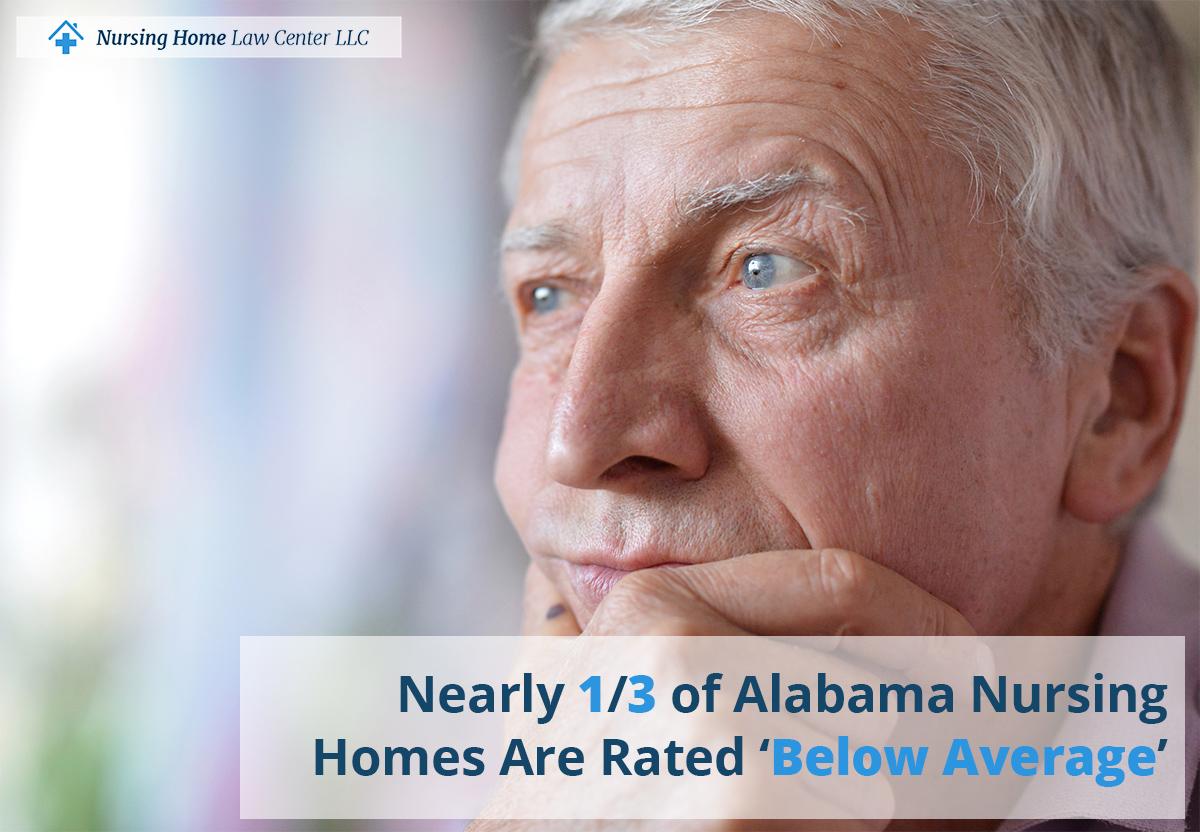
Understanding Your Legal Rights
Federal and state laws protect nursing home residents, guaranteeing their right to receive proper care and live free from abuse or neglect.
One of the most important federal laws protecting residents is the Nursing Home Reform Act of 1987. This law requires nursing homes to provide quality care that ensures the physical, mental, and emotional well-being of their residents.
It outlines the basic rights of nursing home patients, including the right to be free from abuse, neglect, and exploitation and the right to receive appropriate medical care and assistance with daily living activities.
In addition to federal protections, Alabama law imposes strict standards on nursing facilities to ensure the safety and well-being of residents. The state monitors nursing homes through regular inspections and investigates complaints of abuse or neglect. Navigating these state-level regulations often requires localized legal expertise. If your case involves a facility in the state capital region, a Montgomery Nursing Home Abuse Lawyer can assist in filing the necessary documentation with state authorities.
Nursing home residents in Alabama are entitled to receive proper medical treatment, hygiene care, and protection from all forms of abuse.
Eligibility to File a Nursing Home Abuse Claim
In cases of nursing home abuse, the victim or a family member acting on their behalf can file a legal claim.
If the nursing home resident cannot file a claim due to physical or mental incapacity, a legal guardian or someone with power of attorney can pursue the claim.
In tragic cases where the resident has died as a result of abuse or neglect, surviving family members may file a wrongful death claim.
Liability in Nursing Home Neglect and Abuse Cases
In a nursing home abuse case, liability may extend to multiple parties, each responsible for the safety and well-being of the residents. These include:
- Ownership companies
- Nursing home facility
- Staff members
- Management and administrators
- Third-party contractors
How Our Alabama Nursing Home Abuse Attorneys Can Help
At Nursing Home Law Center, our personal injury attorneys are dedicated to advocating for victims of nursing home abuse and neglect. Our team is committed to providing compassionate and effective legal representation, ensuring that nursing homes and their staff are accountable for their actions.
Free Case Evaluation
We offer a free consultation to discuss the details of your case and determine the best course of action. During this initial meeting, a practicing attorney will listen to your concerns, assess any warning signs of abuse, and help you understand your legal rights.
Case Investigation
A thorough investigation is crucial to building a strong case. Our legal team will collect medical records, interview witnesses, and review the facility’s inspection reports to uncover evidence of abuse or neglect.
Filing the Claim
Once we have gathered sufficient evidence, our attorneys will file a nursing home abuse claim on your behalf. This legal document outlines the abuse or neglect your loved one experienced, identifies the responsible parties, and seeks compensatory damages, such as medical expenses and emotional distress.
Settlement Negotiation
In many cases, nursing homes or their insurance companies prefer to settle abuse claims outside of court. Our attorneys are skilled in settlement negotiation, working to secure a fair settlement that covers the full extent of your loved one’s injuries and suffering.
Trial Representation
Our attorneys are fully prepared to take your case to trial if a fair outcome cannot be reached. We have extensive experience representing nursing home abuse victims in court, where we present evidence, call witnesses, and argue for punitive damages when necessary.
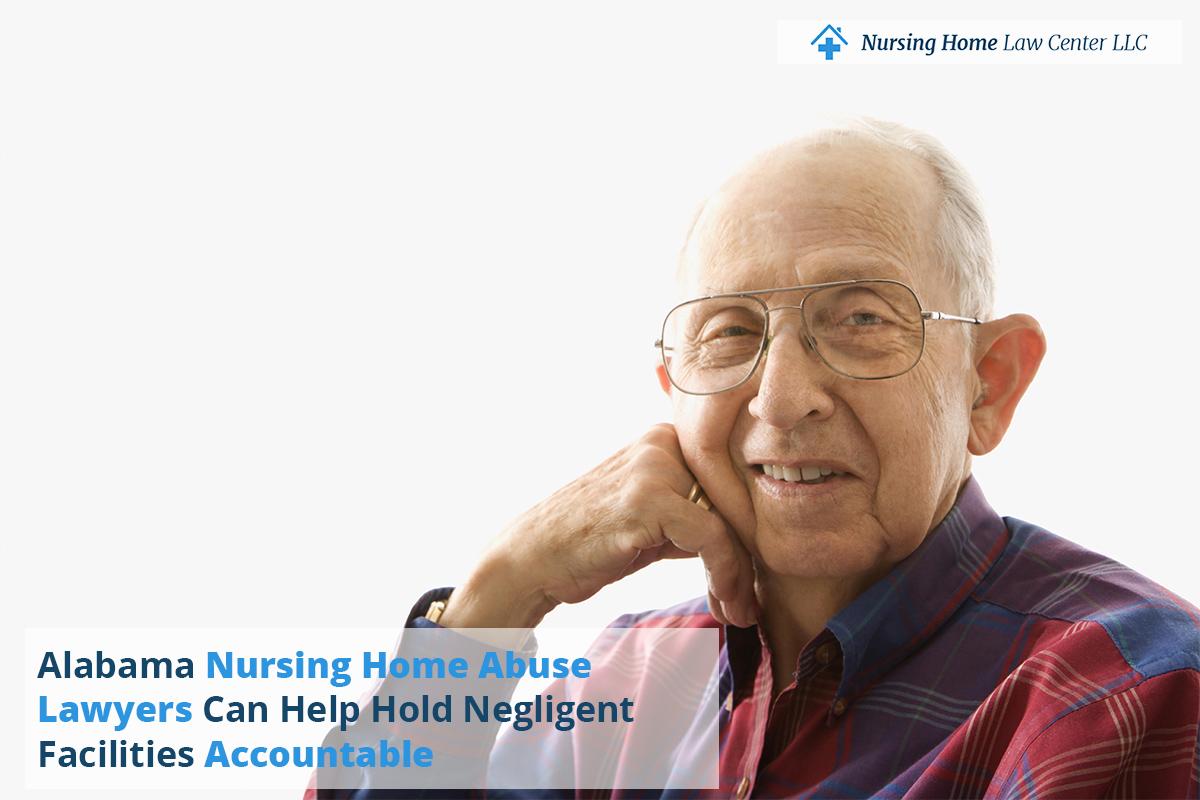
Common Signs of Elder Abuse Among Nursing Home Residents
In Alabama, there are a total of 224 Medicare-certified nursing home facilities. 101 of these facilities (45%) received an overall score of “below average” or “much below average.” These statistics highlight the growing concerns for families in the state’s largest metropolitan area. Residents seeking assistance in Jefferson County should reach out to a Birmingham Nursing Home Abuse Lawyer to investigate potential neglect in these low-rated facilities.
Specifically, 99 nursing homes (44%) fall short in health inspections, and 58 facilities (26%) have inadequate staffing levels. Seventy-seven nursing homes (34%) rated poorly in quality measures. [1]
Recognizing these signs of elder abuse in nursing homes is essential to protecting your loved ones:
- Unexplained injuries
- Marks from physical restraints
- Sudden changes in mood or behavior
- Poor personal hygiene
- Noticeable weight loss
- Bed sores
- Missing funds or unauthorized transactions
- Wandering or elopement
The worst-rated nursing homes in Alabama include:
| Ahc Millenium | Arabella Health and Wellness of Montgomery |
| Arabella Health and Wellness of Selma | Arlington Rehabilitation & Healthcare Center |
| Aspire Physical Recovery Center at Cahaba River | Aspire Physical Recovery Center at Hoover, LLC |
| Attalla Health and Rehab | Azalea Health and Rehab LLC |
| Bibb Medical Center Nursing Home | Brookdale University Park Snf (AL) |
| Canterbury Health Care Facility | Caregivers of Pleasant Grove, Inc |
| Cherry Hill Rehabilitation & Healthcare Center | Cumberland Health and Rehab |
| Diversicare of Arab | Diversicare of Bessemer |
| Diversicare of Foley | Diversicare of Oneonta |
| Elba Nursing and Rehabilitation Center, LLC | Elite Nursing and Rehabilitation Care Center |
| Extendicare Health Center | Falkville Rehabilitation and Healthcare Center |
| Father Purcell Memorial Exceptional Children’s Ctr | Galleria Woods Skilled Nursing Facility |
| Generations of Red Bay, LLC | Generations of Vernon, LLC |
| Glen Haven Health and Rehabilitation, LLC | Glenwood Center |
| Grand Bay Convalescent Home, Inc. | Greene County Nursing Home |
| Lafayette Nursing Home | Legacy Health and Rehabilitation of Pleasant Grove |
| Lighthouse Rehabilitation & Healthcare Center | Magnolia Ridge |
| Nhc Healthcare, Moulton | North Hill Nursing and Rehabilitation Ctr, LLC |
| Oak Crest Health & Wellness | Oak Knoll Health and Rehabilitation, LLC |
| Oaks on Parkwood Skilled Nursing Facility | Prattville Health and Rehabilitation, LLC |
| Ridgeway Rehabilitation & Senior Living | River City Center |
| Robertsdale Rehabilitation & Healthcare Ctr | Self Skilled Nursing & Rehab |
| Signature Healthcare of Whitesburg Gardens | Summerford Health and Rehab, LLC |
| Traylor Retirement Community | Troy Health & Rehabilitation Center |
| Village at Cook Springs Skilled Nursing Facility | Walker Rehabilitation Center, Inc |
| Wetumpka Health and Rehabilitation, LLC | Windsor House |
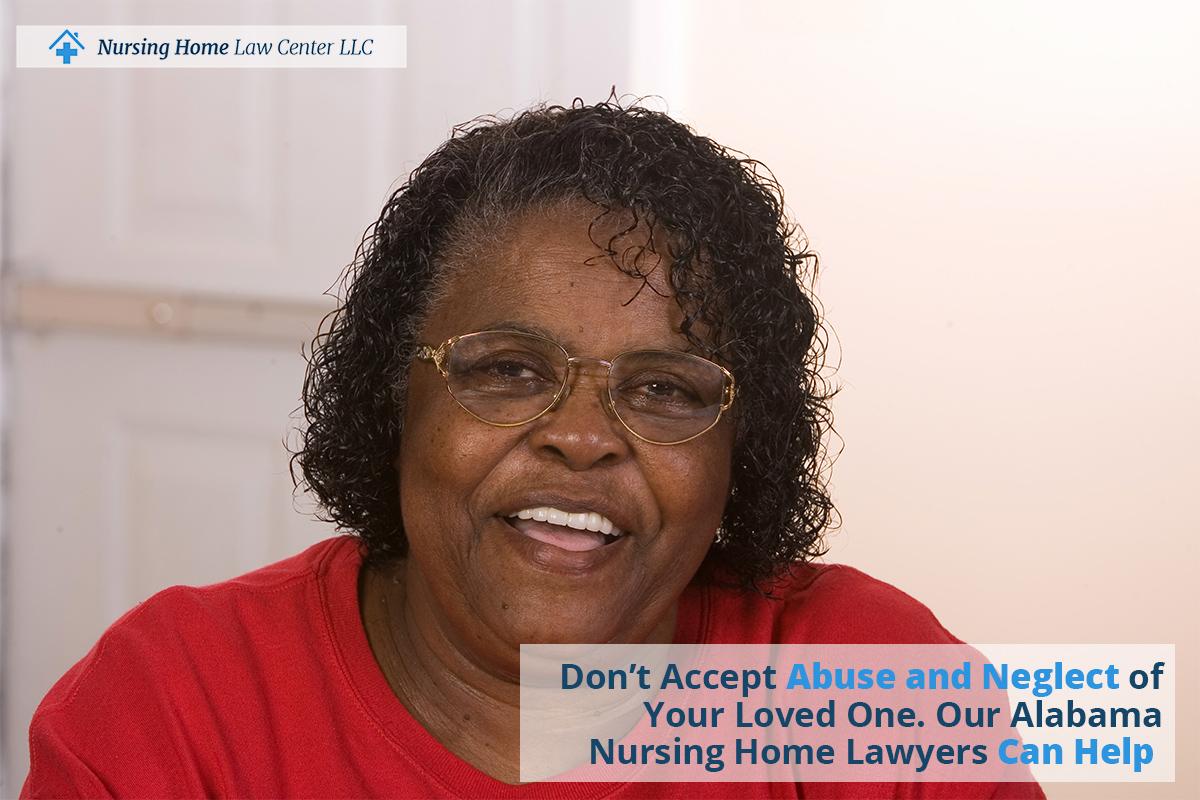
The Cost of Hiring an Alabama Nursing Home Abuse Lawyer
At Nursing Home Law Center, we understand that families may be concerned about the costs of hiring an attorney, especially during such a difficult time. To ease this burden, our nursing home lawyers work on a contingency fee basis.
This arrangement means you do not have to pay any upfront fees or out-of-pocket expenses. We only get paid if we successfully recover financial compensation for your personal injury case, whether through a settlement or trial verdict.
You Have Limited Time to Take Legal Action in Alabama
Under Alabama law, there is a strict statute of limitations for filing a nursing home abuse claim. Typically, you have two years from the date the abuse or neglect occurred or from the date you discovered the abuse to file a lawsuit. Failing to take legal action within this time frame may result in losing your right to seek compensation for your loved one’s injuries.
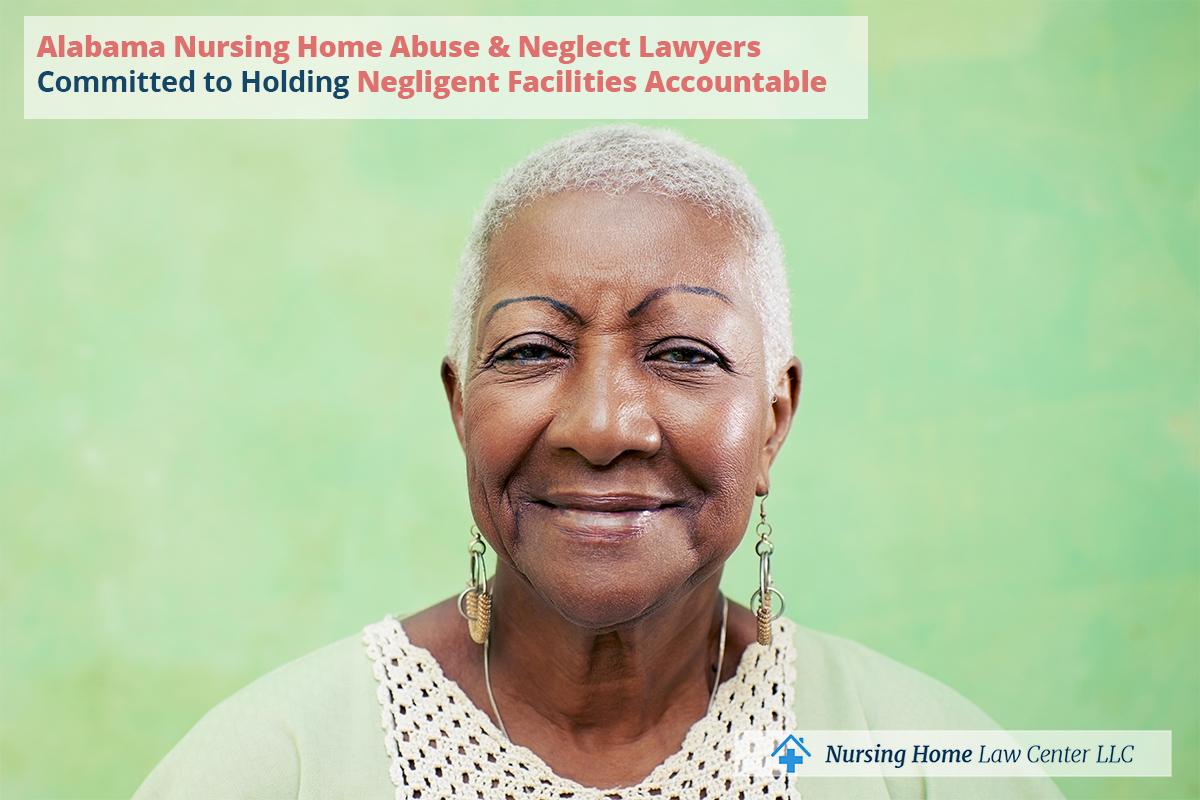
Contact an Alabama Nursing Home Abuse Attorney Today!
At Nursing Home Law Center, our experienced nursing home attorneys are committed to fighting for the rights of victims and their families. With a proven track record of success in handling nursing home abuse cases, we have the knowledge and dedication to help you secure justice and the compensation your loved one deserves.
We understand how overwhelming it can be to face abuse in a healthcare setting, and we are here to provide compassionate support every step of the way.
Call us at (800) 926-7565 or complete our contact form.
References: [1] Medicare
Alabama Nursing Home Abuse Lawyers
Our Alabama nursing home abuse lawyers are dedicated to providing trusted legal assistance to families throughout the state. Whether you’re in Birmingham, Huntsville, Mobile, Montgomery, or Tuscaloosa, our experienced legal team is here to help you seek justice for your loved one. Contact a lawyer in your city today and get the support you deserve.


